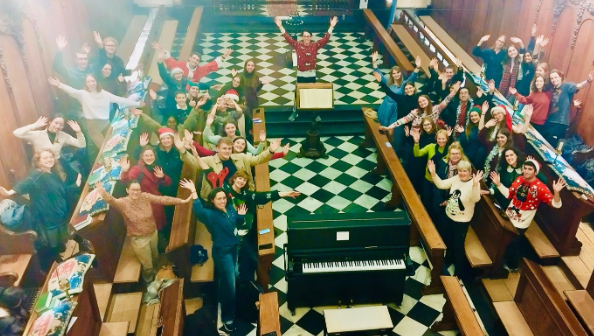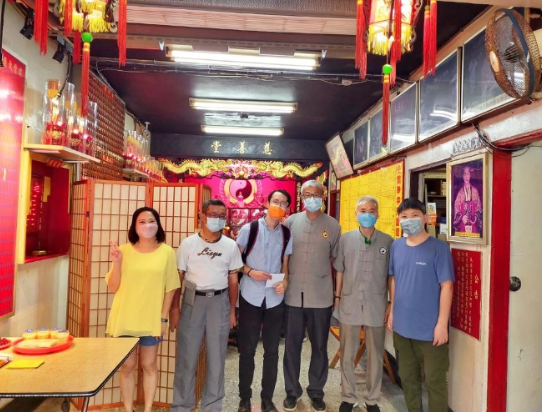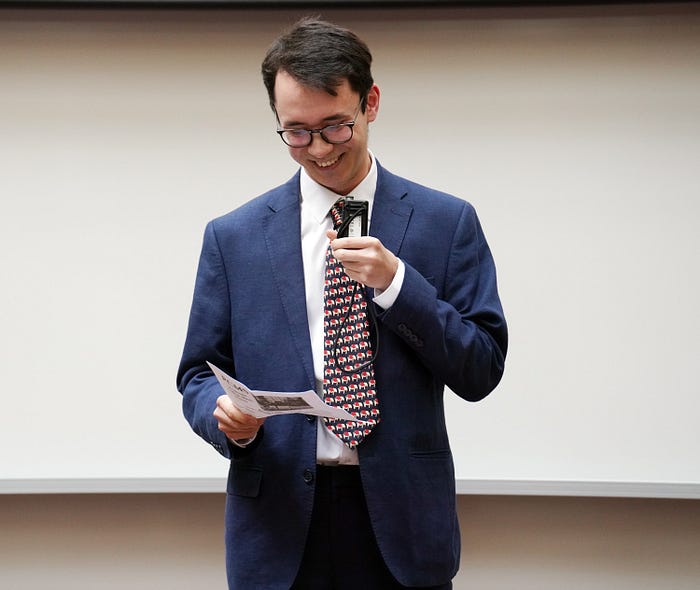It is an immense honour to receive the Vice Chancellor’s Award for Social Impact. I am so humbled to have been nominated and to know that my work has made a difference.
I see it as my responsibility to use my privileged position — particularly having had a musical education and studying at Cambridge — as a platform for making a positive contribution to society. Before coming to Cambridge, I raised over £40,000 for charity by busking and organising musical events like cabarets. I also participated in musical outreach projects with organisations like the National Orchestra for All and National Youth Orchestra. At Cambridge, I was eager to take these efforts further.
However, my ‘Cambridge experience’ was not remotely what I had expected. In March 2020, I was finishing my second term at Pembroke as an Organ Scholar. Having only just found my feet, the COVID-19 pandemic challenged me to find ways to keep the music playing through those deeply troubling times. Pre-pandemic, I often sat down at the piano in Chapel after our choir’s services, taking requests from whoever was there for some informal karaoke. I decided to take this online in a series that I called ‘Lockdown Singalongs’. I ran livestreams on Saturday nights over Facebook Live, with up to a hundred people tuning in live and submitting their requests in real-time, from Disney to Dolly Parton. In an offshoot series called ‘Isolation Improvisations’, I recorded myself playing songs requested by friends and strangers, hoping to shed some light and peace into those difficult days. I later contributed these videos to a virtual concert in aid of refugees in Calais. These experiences made me realise that, if we could find such a sense of togetherness in isolation through music, there was boundless potential for more community-oriented music-making once we were reunited in Cambridge.

Once the pandemic subsided, I set up the Lovely Choir: an unauditioned community choir based in Pembroke Chapel that brings together students and staff to sing. We’ve had lab researchers, administrators, neurologists, alumni, librarians, cleaners, development workers, and more. We do not use sheet music; instead, anybody can shout out their requests from the floor — ranging from Broadway showtunes to the Spice Girls — and I play them on the piano for everyone to sing along. Some of our weekly sessions have seen over sixty people in attendance. Last December, we had nearly 250 Pembroke undergraduates packed into the Chapel for the Lovely Choir’s ‘Christmas carol singalong’, which featured a liberal interpretation of ‘carols’, including the greatest hits of ABBA.
Most important, however, is that the Lovely Choir is an unconditionally inclusive, empowering, safe space where everybody feels that they belong. Musical democratisation is particularly urgent at Cambridge, where the scene can be elitist and driven by ‘standards’ at the expense of widening participation. Finding one’s voice, taking up space, making noise, overcoming nerves, feeling seen and heard — everybody deserves to enjoy these rewards of collective music-making, regardless of background, confidence, perceived ability, or identity. I am most grateful to the member of the Lovely Choir who nominated me for this award and can only hope that it speaks to the Lovely Choir’s small contribution towards this vision. It is in the same spirit that I have begun teaching ‘welfare salsa dancing’ classes for beginners as part of the Churchill College Dance Society.

Singalongs and salsa aside, I love to give back through community outreach work. Alongside my university studies during my Year Abroad in Taiwan, I worked at a local NGO that combats gender-based violence in Asia and volunteered in a small folk religious temple in suburban Taipei. I am particularly passionate about educational access, having worked for the Cambridge University Education Development Trust, with whom I taught English to underprivileged children in a rural Chinese village. I have volunteered as a mentor for programmes like the Coronavirus Tutoring Initiative and as a student ambassador for the Oxbridge access organisation Zero Gravity, as well as my College and Faculty.

When I spoke to the ritual masters, priestesses, and volunteers at the aforementioned folk temple in Taipei, they told me about how they felt themselves and their practices to be marginalised. People often denigrate religion’s relevance in the digital age. Based on this, I published an article in the British Journal of Chinese Studies, which opened my eyes to the power of academic research to amplify forgotten voices and make a positive impact. To further these aims, I am currently developing a project based on my experience living with Buddhist monks in the Taiwanese mountains, and co-authoring a book with Professor Adam Yuet Chau (Cambridge) and Dr. Jacqueline Lin (Chinese University of Hong Kong) on Chinese state-society relations and social activism, which we hope to publish in 2024/5.
I am most grateful to the Vice Chancellor for presenting me this award, to Cambridge Hub for hosting the ceremony, to the judging panel (Dr. Alison Wood, Dr. John Munns, Haley Huang, Oli Gray, and Sim Dhanjal), and to the other winners, whose incredible dedication to social and climate action has inspired me greatly and motivated me to take my social impact efforts to the next level.


Instagram: @joe.beadle https://www.instagram.com/joe.beadle/
LinkedIn: https://www.linkedin.com/in/joseph-beadle-李忠恕-357435111/
Twitter: @joe_beadle https://twitter.com/joe_beadle
